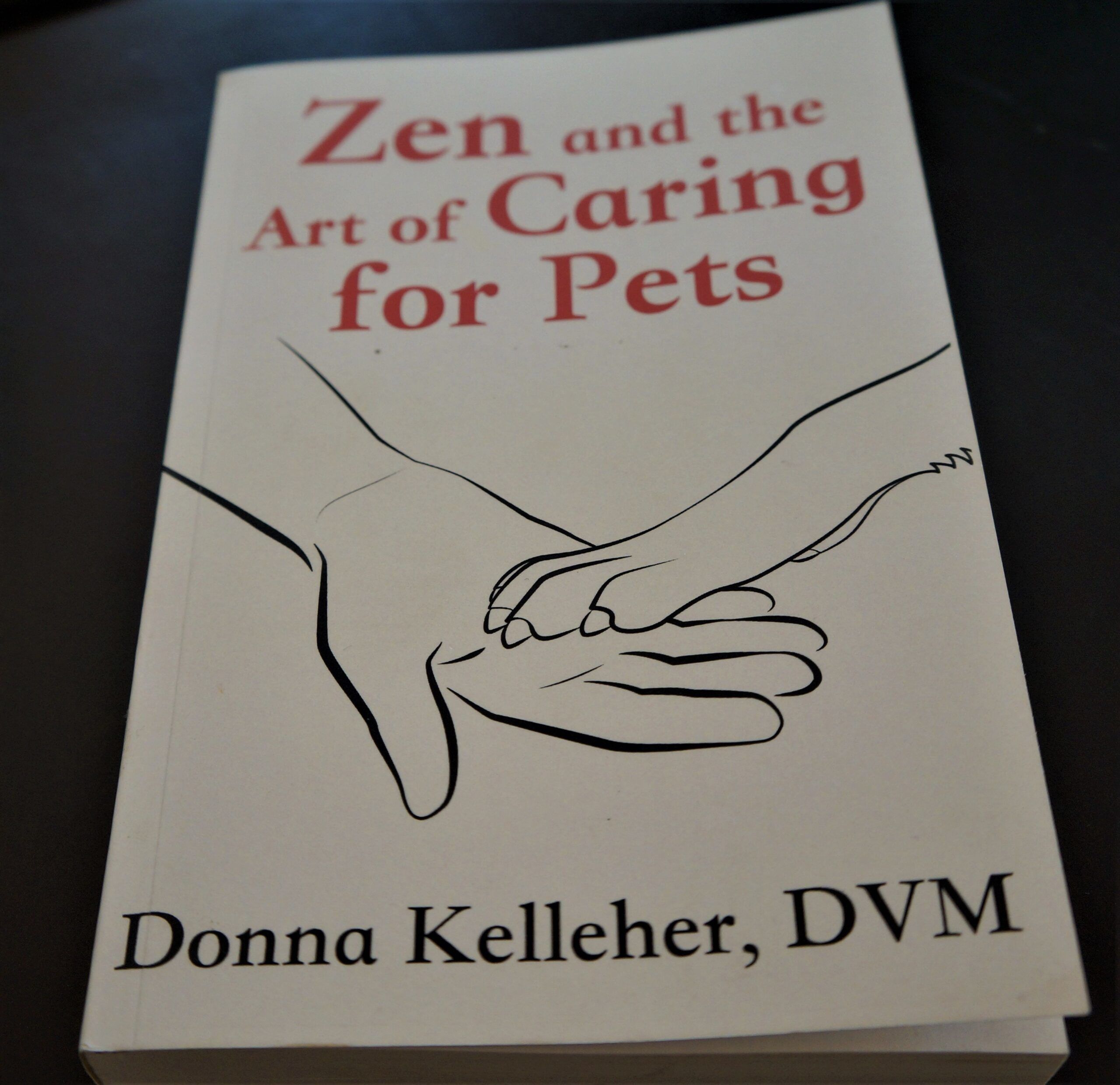Donna Kelleher, DVM, is a holistic veterinarian who works in the Pacific Northwest of the United States. Her most recent book Zen and the Art of Caring for Pets chronicles her career path and challenges. This includes the demands of the veterinary profession itself and the pressures (and annoyances) caused by clients.
Over the years, she worked in emergency / critical care. She also worked for a veterinary practice purchased by a corporation. The book addresses the high rate of suicide among veterinarians (that I talked about recently in the post about how not to get fired as a veterinary client). Kelleher offers keen insights into how she practices veterinary medicine today -- from cancer cases to chronic allergies and beyond. The 2 of us agree on many things. Some things in the book, though, I disagree with, doubt, and bring a heavy dose of skepticism to. She knows that based on our private conversations via email, Yet, she encouraged me to write a book review anyway. So here you go.
More...
What You Can Learn from Zen and the Art of Caring for Pets
If you're facing something medical that seems insurmountable with your dog, I think you can learn a lot about what's possible. Consider taking a different path and mindset toward veterinary care like what Kelleher offers. Her clients and patients often arrive with these conditions:
- Rampant itching / allergies / secondary infections
- Cushing's Disease
- Cancers of various types
- Bladder infections / incontinence
- Irritable bowel syndrome
And, you'll learn about what's going on behind the scenes in traditional veterinary practices. Get insights about the smart, committed, and compassionate people who choose this profession. Learn how the work pressures and client demands pile up.
Our example
Our youngest, Mr. Stix, and his autoimmune skin issues would probably be a good candidate for someone like Kelleher. For those playing the home game, we restarted him on a much lower dose of the immune suppressant drug. Today is day 5. So far so good. He'll be on that dose for 2 weeks. Then, we'll jump up one more level and see how he does.
Points of Agreement with Zen and the Art of Caring for Pets
Kelleher shares ways she learned to process interactions with veterinary clients and coworkers. She reflects on the cases that linger on the heart and mind. She talks about navigating situations where caring does real damage to her and others in the veterinary profession.
Kelleher finds ways to engage with clients and their pets now that create space for connection and improved wellness for each participant in the process. That process often seems to require much more of families. That includes frequent appointments (at least initially), various holistic herbs or products, home-prepared meals (raw or cooked), and sometimes sourcing and rotating unusual protein sources.
So far so good, right? I'm not particularly for or against any of that ... even knowing how often home-made pet diets end up being deficient in various ways.
Kelleher and I share concerns with overvaccination in pets. We've traded notes about how I leverage titer tests for my current crew. That decision follows our original canine heroine suffering a rare / severe adverse rabies vaccine reaction that resulted in a long battle that we ultimately lost.
She uses acupuncture and chiropractic, both of which I've used for my dogs over the years.
Kelleher often prescribes things from Chinese medicine, which I've used for myself along with acupuncture many years ago to resolve a chronic condition. I worked with an honest-to-Pete, from-China Chinese practitioner who sent me home with paper bags of dried herbs and stuff to boil into a foul-smelling / horrible-tasting tea.
She takes on cases that often feel hopeless to families.
Points of Disagreement and Skepticism
I hung in there with Kelleher for most of the book. I really did, even when her descriptions of clients and client behaviors made me bristle. Here, though, are the main things where our views don't align:
- Muscle testing to decide what foods and supplements pets can (and cannot) handle
I know people who use this method and swear by it. Yet, the skeptic in me hollers, "Baloney!" It feels almost like a carnival barker with a magical elixir or a con / trick of some sort.
- The whole chapter on diet-associated dilated cardiomyopathy (DCM)
I feel that the book downplays the risks and offers strawman-type arguments that point to and quickly dismiss pieces of the conversation.
Others in the field
I'm convinced the concerns over certain diets causing DCM in dogs that typically do not get it are real and dire. I wrote about the diet-associated DCM state of things in 2020. That work allowed me to interview some of the cardiology / animal nutrition researchers trying to chase down what's happening and why.
Plus, I'll share that several of the top people looking into this issue have been harassed (online and otherwise) because of their work on DCM research. For that reason, several of them declined to even speak with me. The online mobs spurred by the diet-associated DCM issue are prime examples of how bad things have gotten. It's an example of things that add to the mental health crisis in the veterinary profession.
A couple of the people who did speak to me for the article confirmed essentially that they know it's associated to certain foods in some way. They told me that the last time this happened (the taurine issue) that pet food companies did not deny the problem or attack those looking for answers. Instead, those companies poured money into research to find -- and then solve -- the problem with the diets.
I haven't had time to read the latest published research on what researchers are learning about elements of the implicated diets. This is a pretty good summary of what's new in 2021, written by a veterinary student I follow online.
Is Zen and the Art of Caring for Pets for You?
Good question.
If you're already a user of holistic pet care, then I think you'll enjoy the details and insights on cases.
Considering holistic pet care? then I think it will be important to read the chapter called "The Healing Crisis," which explains what's happening if / when a pet develops what looks like a massive bad reaction to treatment. Without knowing that was possible, I can absolutely see people (including me) freaking out and never going back to a holistic provider.
If you would like to know more about the veterinary profession's challenges, then I think you'll learn a lot -- maybe even be shocked by things like the veterinarian who lost use of one arm from a failed suicide attempt using injected euthanasia solutions.





0 comments